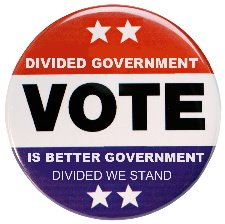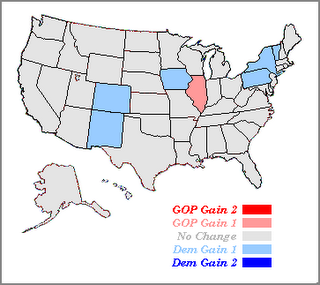"Woe, woe is me! What words, or cries, or lamentations can I utter?"
The Chorus in Hecuba by Euripides
Update appended May 18, 2006I had a dalliance with the Libertarian party in my youth. She seemed dangerous, but so radiant, so pure, so exciting, so ... so right. As I matured, became more practical and yes, more cynical, we drifted apart. Since then, I have settled into a comfortable long term relationship with the
Cato Institute - a Libertarian think-tank. I have tremendous respect for the organization and their product. They generate tons of great research, clear hard-number analysis, and are relentless advocates for libertarian principles. They have done more to "change the debate", to introduce and defend libertarian ideas into mainstream politics any other libertarian organization, including the party. They have earned the highest compliment I can give them - They have made a difference.
Coincident with the start of this blog,
Cato Unbound (a monthly single topic interactive blog) launched a dialog on the topic
"The Gop and Limited Government - Do they have a future together?".
"The era of big government is alive and well. You might think that after dominating all branches of the federal government for more than a half decade, Republicans, who like to talk big about lean and limited government, might have taken Leviathan down a few notches... Republicans under Bush have tallied up a budget deficit of historic proportions, added an enormous entitlement to an already unsustainable system, created a vast new security bureaucracy, and strengthened Washington's grip on local schools. Are Republicans selling out ..."
The hand-wringing, cries, lamentations and rending of garments in this series are quite remarkable. Some samples from both the initiating essays and responding Libertarian leaning blogs are excerpted and linked below. They are similar in form, with each complaining bitterly about how the Republicans have made things worse, and then offering up a few "straws to grasp at" for the aggrieved and betrayed supporters of limited government.
Great articles all, and well worth the read. Still, the series reminds me of a humorous commercial currently running on television: In the ad, a group of bankers are hiking through the jungle, and one falls into quicksand. The group forms an "emergency" discussion committee to develop alternative responses to the crisis, while the guy sinks out sight.
My contribution and advice to worried libertarians:
Your "limited government" patient is lying unconscious on the ground bleeding to death. Yes, the patient's leg was blown off by a Republican roadside bomb, and we are all angry at the Republicans and feel really bad about what happened. But this might not be the time to discuss where to build a hospital and how to equip a surgical suite to treat the patient. Right now, we really need to apply a tourniquet and stop the bleeding.Fortunately,
there is a tourniquet in easy reach, from William Niskanen, one of Cato's own.
The tourniquet is the election of a divided government in the 2006 election. Apply it first, and once the bleeding is managed, we have an opportunity to help the patient with more advanced treatments.
-------------------
Republicans and the Flight of Opportunity by David Frum"The goddess was Opportunity and conservatives and Republicans today can appreciate the poignancy of the poet’s description of her departure... deficits in the $400 billion range not only preclude future tax cuts but also raise real doubts about the sustainability of the Bush tax cuts... Meanwhile, the pressures for even further expansion of government are gathering... The state is growing again and it is pre-programmed to carry on growing. Health spending will rise, pension spending will rise, and taxes will rise...The second possibility is that conservatism will live on as a tendency within both parties rather than as a compact and self-conscious movement in control of one of them.... Might not the same be true of the small-government conservative beliefs championed by Goldwater, Reagan, and Gingrich? It may not be the future we expected for ourselves but what future is?"
-----------------
The Forecast is Grim - So What Are We Going to Do About It? by Bruce Bartlett"I am very pessimistic about the prospects for conservative/libertarian reform... my friends must think I have totally thrown in the towel on bigger government. This is not so. What I have discussed thus far is simply a forecast of what I see coming... I would welcome a serious debate among libertarians and small government-types on a realistic political strategy for achieving their goals. Simply damning the existing system and withdrawing from it is just a prescription for accelerating the trend toward bigger government.
------------
Where There Is No Vision, the People Perish by David Boaz"Republicans used to accuse Democrats of setting up a nanny state, one that would regulate every nook and cranny of our lives. They took control of Congress in 1994 by declaring that Democrats had given us government that is too big, too intrusive, and too easy with the public's money. After 10 years in power, however, the Republicans have seen the Democrats’ intrusiveness and raised them.... Where there is no vision, the people perish. Or at least the party and its principles... The first task for advocates of limited government is to develop and advance that vision. The Founders, the abolitionists, the free-traders, the Progressives, the Reaganites all honed and advocated their ideas long before they saw political victory. And we must translate that vision into policy proposals, organizations, and political movements... We don’t have to resign ourselves to a counsel of despair. "
---------------
The Volokh Conspiracy - George W, Richard Nixon, and Big Government Conservatism - Ilya Somin"By now, it is no secret that Bush has presided over a massive expansion of government, even if one sets aside the increase in defense spending since 9/11... In the posts cited above, Bartlett and Frum produce some strong arguments showing that Bush's big government policies might prove to be more lasting than Nixon's did (Goldberg is less pessimistic)... Make no mistake - the growth of government is a very powerful trend, and Bush has done a great deal to exacerbate it. But we should not be too quick to assume that the trend is irreversible."
================
Update: 17-May-06In
"The Democrats and Small Government",
Ross Douthat adds to the Cato Unbound conversation by explicitly acknowledging the immediate benefit to be derived from Divided Government:
"Divided government, maybe, is a way to rein in spending."..
But then with a bit intellectual sleight of hand, quickly dismisses the notion by saying you can't support Democrats, well, because they are Democrats.
"... as long as the Democrats are the party of unions, minorities, big-government working-class voters, and converted Rockefeller Republicans... they will never offer a plausible home to anyone who cares about reducing the size of the federal budget...."
"...The Cato Institute and the Christian Coalition are never going to see eye to eye on everything, but they still have a lot of common ground —and a common enemy."
By this conclusion I assume that Douthat is advocating libertarian fealty to the Republican party, supported by the "enemy of my enemy" argument. This is nonsense. To support the acknowledged benefit of divided government by voting Democratic in the 2006 election, is not the same as "finding a home" in the Democratic party. It is simply tactical support to obtain an immediate and desireable result: Fiscal restraint and better federal governance through the mechanism of divided government. To continue to support Republican single party control of the Federal Government in the face of what has actually transpired over the last five years can only be read as a naked appeal to "pay attention to what Republicans say, but ignore what they do."
In fact, by achieving the result of divided government through the support of Democratic candidates in 2006, the supporters of limited government will have a stronger foundation for supporting the Republican presidential candidate in 2008, with the enhanced hope that the next Republican President will actually "walk the walk".
For limited government advocates in 2006:
Republican vs. Democrat is a false choice.
The real choice is Divided Government vs. Single Party control.
===============
Update: 18-May-06
Ryan Sager author of
The Elephant in the Room almost gets it right in a couple of interesting posts over at RCP. These quotes from
"Hot-Tub Libertarians" and
"Out of the Hot Tub, Into the Frying Pan":
"As the Republican Party abandons its commitment to small government, how politically impotent are libertarians? ...no one ever said that libertarians were organized -- or that, when it comes to politics, they have much in the way of brains... But what if they did? How powerful a voting bloc could they be? It's a tough question, and one libertarians have spent far too little time effort researching, but there's a quick and dirty answer: somewhere between 9 percent and 20 percent of the electorate.
"Libertarians need to get serious. And getting serious means organizing. And organizing means within one of the two major parties. I believe that can only be done within the GOP, that there is still a natural logic to fusionism. But I'm happy to hear arguments otherwise."
Okay, Ryan - here is an argument otherwise. Let us deconstruct:
"Libertarians need to get serious." Right.
"Serious means organizing." Right again.
"Organizing means within the one of the two major parties" - hmmm - almost right. I'd put it this way: Organizing means within the existing two party structure.
"Only be done within the GOP"? Wrong.
As pointed out in Ryan's article, libertarian organization is going to have to look different than traditional politics, after all, it is something we will have to be able to accomplish while sitting in the hot-tub.
What is needed, is an
organizing principle. Ideally, a principle that is so obvious, so logical, and so clear-cut, that no leadership is needed, no parties are needed, no candidates are needed, and no infrastructure is needed. Ideally it is this easy: You think about the principle, and you know how to vote.
That organizing principle exists. It is Divided Government. It is absolutely clear-cut and easy to understand.
Divided Government is documented by Niskanen et.al. to work in a practical real-world manner to restrain the growth of the state. As a
voting strategy it can be implemented immediately. More importantly, it can collectively be implemented individually as we sit in our hot tubs and ponder the sorry state of the world.
Whatever the percentage of the electorate that libertarians represent, whether it is 9% or 20%, if they vote as a block for Divided Government, they immediately become
the brokers of an evenly split partisan electorate. They arguably become the single most most potent voting block in the country, specifically because they are willing to vote either Democratic or Republican as a block. Specifically because they are
not fused to one party or the other.
It means, libertarians must ignore what the politicians say and look at what they actually do (
Niskanen again). It means ignoring spurious invitations to fuse with a big tent party that no longer stands for anything meaningful. It means voting straight Democratic in 2006, and (if successful in establishing Divided Government) voting Republican for President in 2008. It means the difference between libertarians being a completely impotent political force, and libertarians having the biggest swinging political "hammer" in town.
And it can be done from the hot tub.
And it can be done this year.
Just Vote Divided.
 Two examples of the growing and increasingly vocal discontent among Republican fiscal conservatives with this administration and the Republican Congress.
Two examples of the growing and increasingly vocal discontent among Republican fiscal conservatives with this administration and the Republican Congress.





